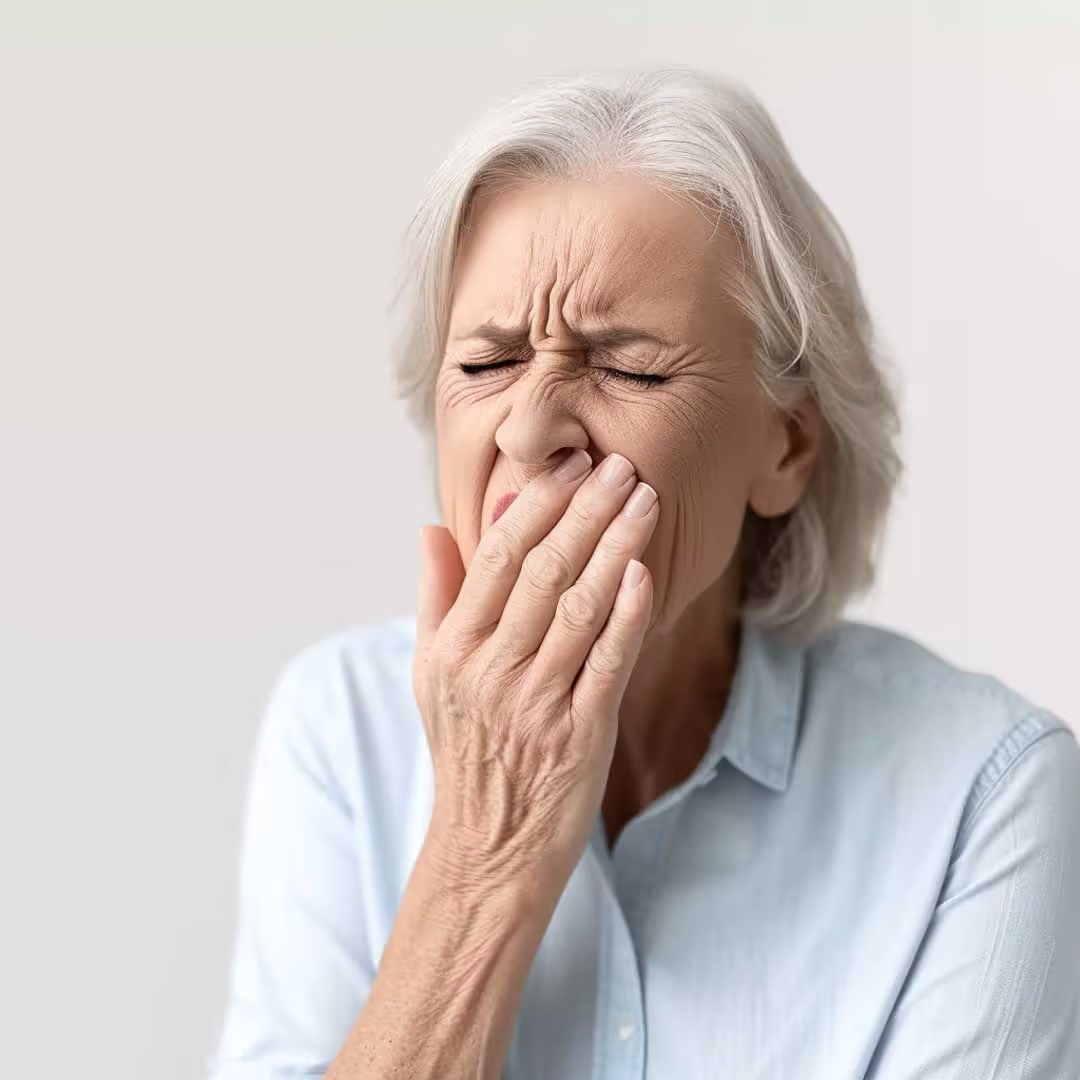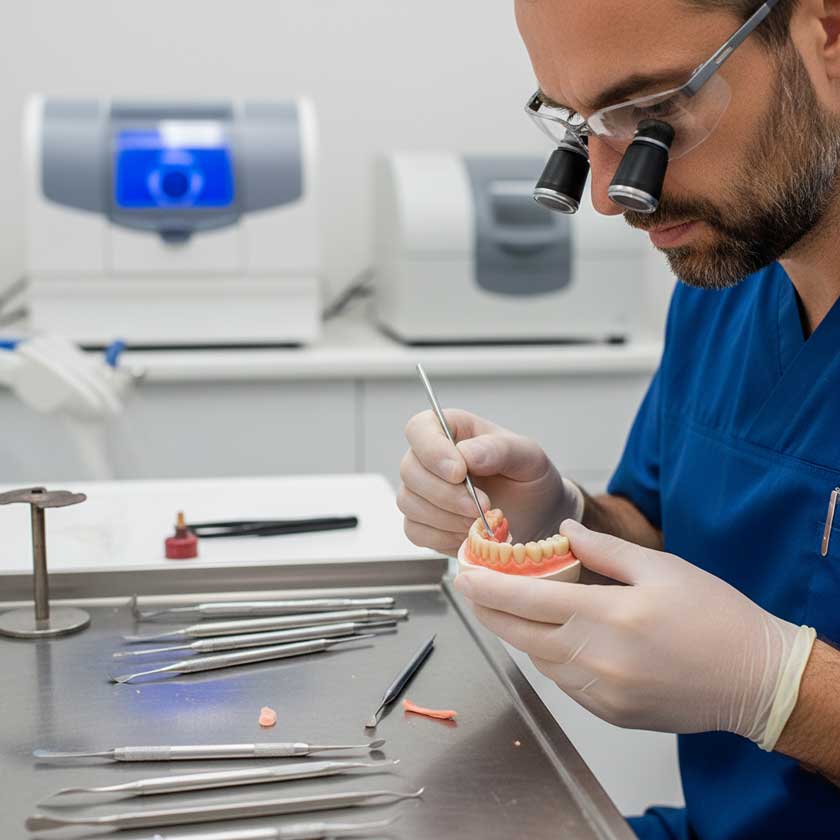Key Takeaways:
- Significant Impact of Denture Pain: Denture pain, often underestimated, can severely impact daily activities like eating and talking. It's crucial to address this discomfort promptly to avoid complications and maintain a good quality of life.
- Causes and Consequences of Denture Pain: Ill-fitting dentures, an uneven bite, and poor oral hygiene are primary contributors to denture pain. Ignoring these issues can lead to severe problems such as swollen gums and bone loss in the jaw.
- Effects on Eating and Speaking: Denture pain can make eating difficult, leading to nutritional deficiencies and avoidance of certain foods. It also affects speech clarity, potentially causing embarrassment and communication difficulties.
- Natural Remedies for Relief: Warm salt water rinses and aloe vera gel are effective natural remedies for alleviating denture pain and inflammation. However, these remedies should be complemented with professional dental care for long-term solutions.
- Dietary Adjustments to Alleviate Pain: Incorporating soft, soothing foods like yogurt, and maintaining good hydration can temporarily relieve denture pain. While helpful, these dietary changes are not substitutes for professional dental treatment.
- Managing Effects of Coffee and Tea: Regular consumption of coffee and tea can stain dentures and potentially worsen existing gum irritation. Proper denture care, including using dental adhesives and ensuring a good fit, is essential to mitigate these effects.

Impact on daily life.
Although denture pain may appear minor, we should not underestimate its impact on our daily lives. If your dentures are uncomfortable, it can be challenging to eat and talk.
That's why it's crucial to address denture pain promptly and effectively. Ignoring the issue could lead to further complications such as mouth ulcers, swollen gums, or even bone loss in the jaw.
Denture pain affects our ability to enjoy meals, so it's important to address it. Dentures that pinch or cause sore spots can make chewing painful and difficult.
Why addressing denture pain matters.
Imagine experiencing discomfort and frustration with each bite as you try to savor your favorite foods. This affects our health and enjoyment of eating, which is an important part of our daily routine.
Moreover, denture pain can also hinder clear speech, making it harder for us to communicate. Poorly fitting dentures can cause gum irritation and inflamed tissues, making it hard to pronounce certain sounds.
The embarrassment of slurred speech or mispronunciation can affect our confidence in social situations or professional interactions. In addition to these practical challenges, untreated denture pain may have long-term consequences if left unaddressed.
Continuous pressure from ill-fitting dentures may result in gum sores that don't heal easily or lead to infections in the mouth. Long-term irritation can lead to jaw bone loss, which may impact facial structure and oral health.
To avoid making these problems worse or long-lasting, it's important to act quickly when dentures cause pain. This article will discuss natural remedies and treatments for easing denture pain. You can do these methods at home or with the help of a dentist.
Understanding denture pain.
Common causes of denture pain.
Understanding Denture Pain Denture pain is a common issue faced by those who wear dentures. It can range from mild discomfort to sharp, persistent pain, making it essential to understand its root causes.
One of the primary contributors to denture pain is ill-fitting dentures. Badly fitting dentures can hurt gums and soft tissues by putting too much pressure on certain spots.
Another cause of denture discomfort is an uneven bite. If your false teeth don't fit well with your real teeth, it can cause an uneven distribution of biting force.
The consequences of ignoring denture pain.
This imbalance can lead to increased pressure on specific areas, causing pain and discomfort. Furthermore, poor oral hygiene can exacerbate denture irritation and discomfort.
If you don't brush and floss well, dentures can trap food, leading to gum inflammation and pain. It's important not to dismiss any signs of denture pain as merely temporary or insignificant.
Ignoring these symptoms can lead to more severe issues such as swollen gums or even bone loss over time. So, if your dentures hurt and the pain worsens, you should visit a dentist for a check-up and to receive advice.
Next, we will explore natural remedies and changes you can make at home to alleviate denture discomfort. Before we explore solutions, let's answer common questions about how coffee and tea affect denture comfort. This will help us fully understand the topic.
Impact of denture pain on eating, speaking, and daily activities.
How denture pain affects eating?
Denture pain can have a significant impact on a person's ability to eat, speak, and carry out daily activities. Addressing any discomfort or pain caused by dentures is essential as it can greatly affect one's quality of life. When dentures are ill-fitting or uncomfortable, eating becomes a challenging task.
The improper fit can cause difficulty in chewing and biting down on food. This may result in avoiding certain foods that require more effort to eat, such as crunchy vegetables or chewy meats.
Denture pain can cause an uneven bite, making it difficult to chew food properly and leading to digestion problems. Poorly fitting dentures can also affect speaking.
The Impact of denture pain on speech.
When dentures are loose or wobbly, they can click or shift while talking, making it difficult to enunciate words clearly. This can cause embarrassment and frustration when trying to communicate with others.
Denture pain and daily life.
Ill-fitting dentures moving against gums can cause inflammation and sores, making speech problems worse. Daily activities such as laughing and smiling may become uncomfortable experiences for those with denture pain.
Rubbing or pinching from dentures can cause sore spots or gum lesions, making natural expressions painful instead of enjoyable. Moreover, persistent pain from poorly fitting dentures may create an overall feeling of unease and dissatisfaction.
To alleviate these challenges associated with denture pain, seeking professional help is crucial. Dentists specializing in dental implants or prosthodontics have expertise in addressing denture-related issues.
They can offer solutions like realigning the dentures for a better fit or suggesting treatment options such as dental implants for improved stability. The impact of denture pain on eating, speaking, and daily activities cannot be understated.
Don't ignore any discomfort with dentures. Find relief for sore spots, stop pinching, and make sure dentures fit well. Dealing with these problems quickly allows people to enjoy eating again. It also helps them speak confidently and perform daily tasks without denture pain interfering.
Can dinking coffee or tea cause denture pain?
The effects of coffee and tea on dentures.
Drinking coffee or tea is a common morning ritual for many people, but can it cause denture pain? The answer is, it depends.
Both coffee and tea can have certain effects on dentures and the soft tissues in the mouth that may contribute to discomfort. Let's take a closer look at how these beloved beverages can potentially impact denture wearers.
One of the primary concerns with drinking coffee or tea when wearing dentures is the potential for staining. Both beverages contain compounds called tannins, which have a strong affinity for binding to surfaces like teeth and dentures.
Professional care vs. dietary adjustments.
Over time, regular consumption of these drinks can lead to noticeable discoloration of the denture material. While this staining itself may not directly cause pain, some individuals may feel self-conscious about the appearance of their teeth as a result.
In addition to staining, hot liquids like coffee and tea can also worsen existing gum irritation or sore spots caused by ill-fitting or poorly adjusted dentures. The high temperature of these beverages can further irritate sensitive gum tissues, leading to increased discomfort.
If your dentures are causing pain or discomfort, it is important to prioritize fixing the problem. This includes issues such as loose dentures or poor fit. Instead of simply avoiding certain drinks, it is crucial to address these problems. If coffee or tea makes your dentures uncomfortable, try these strategies to enjoy your daily cup(s) still.
Preventive measures and professional advice.
First and foremost, ensuring that your dentures fit properly is crucial in preventing pain and irritation. Suppose your prosthetic appliance doesn't fit well anymore due to bone loss or natural changes in your jaw structure over time. In that case, it might be time for a dental check-up or to consider alternative options like dental implants.
Using dental adhesive correctly can improve stability and reduce friction between gums and denture base. Your dentist recommends using a small amount of glue to improve the fit of your dentures. This can also reduce the chances of developing painful spots or ulcers on your gums.
Remember, denture adhesive doesn't replace the need for denture adjustment or replacement when necessary. Coffee and tea do not directly cause denture pain. However, they can worsen the pain for individuals with ill-fitting dentures or gum irritation.
Staining and increased sensitivity from hot liquids can worsen existing issues. To solve these issues, seek advice from a professional. If necessary, adjust your dentures. Additionally, consider dental implants as a more comfortable and well-fitting solution.
What are some natural remedies for denture pain relief?
Using warm salt water and aloe vera.
When it comes to finding natural remedies for denture pain relief, there are a few options that you can try at home. One of the most effective methods is using warm salt water rinses. Simply dissolve half a teaspoon of salt in a cup of warm water and rinse your mouth with this solution.
Not only does this help to alleviate gum pain and inflammation, but it also promotes good oral hygiene by killing bacteria that may be causing discomfort. Another natural remedy for denture discomfort is using aloe vera gel.
Aloe vera gel can soothe gums and reduce inflammation when applied directly in small amounts. It helps relieve sore spots. People have used aloe vera, a plant, for a long time to treat skin problems and improve oral health.
Natural remedies can help with denture pain, but they may not get rid of the root cause completely. It's important to see a dentist if you have ongoing gum pain or worries about your dentures.
The importance of professional dental care.
To complement these natural remedies, maintaining good oral hygiene practices is essential. Brush and floss your natural teeth and clean dentures to prevent gum problems from food or bacteria.
If your dentures are loose and uncomfortable, try using a denture cushion or adhesive. This will make them more stable and prevent any rubbing or pinching sensations. If your false teeth are not fitting well or causing discomfort, visit your dentist to fix or adjust them.
To ease denture pain and feel more comfortable, use natural remedies regularly and seek professional assistance as necessary. Addressing issues promptly helps with immediate discomfort and improves long-term oral health and overall well-being.
Are there any foods or drinks that can help alleviate denture pain?
Soothing foods and hydration.
Certain foods and drinks can help relieve denture pain and make you feel better. Adding these items to your diet may help with denture pain, but they will only solve some of your problems.
One popular choice is consuming foods that are soothing to the gums. Yogurt is soft, easy to eat, and has probiotics that help oral health.
This can help reduce inflamed gums and provide some relief from denture soreness. Adding soft fruits or cooked vegetables to meals can help relieve gum pain by reducing pressure on tender gums.
Professional care vs. dietary adjustments.
Another option to consider is incorporating more fluids into your daily routine. Drinking plenty of water is not only essential for overall health but also for maintaining good oral hygiene.
Drinking sufficient water helps prevent dry mouth. A dry mouth can worsen gum irritation and increase the risk of mouth ulcers or gum sores. Herbal teas like chamomile or peppermint can calm swollen gums and temporarily relieve denture pain.
These foods and drinks can help with denture pain but are not a replacement for professional dental care. If you experience pain or notice signs of infection or bone loss, schedule an appointment with your dentist for a check-up.
They can find problems like dentures that don't fit well or inflamed gums. They can identify problems such as ill-fitting dentures or inflamed gums. You can address these issues by using a cushion or stabilizer for the dentures.
These aids can help alleviate sore spots or excessive movement of the dentures. Incorporating these dietary adjustments along with proper dental hygiene practices – such as regular brushing of both natural teeth (if applicable) and dentures – will help maintain optimal oral health while also providing some relief from those pesky denture-related pains.
FAQ - Denture pain.
What are the main causes of denture pain?
The primary causes include ill-fitting dentures, an uneven bite, and poor oral hygiene.
Can denture pain affect my daily life?
Yes, denture pain can significantly impact daily activities like eating, speaking, and social interactions.
What complications can arise from ignoring denture pain?
Ignoring denture pain can lead to mouth ulcers, swollen gums, and even bone loss in the jaw.
How does denture pain affect eating and speaking?
Denture pain can make chewing difficult and affect the clarity of speech, leading to communication challenges.
FAQ - Denture pain relief.
What are some natural remedies for denture pain relief?
Warm salt water rinses and aloe vera gel can help soothe gum pain and reduce inflammation.
Can changing my diet help with denture pain?
Yes, eating soft, soothing foods and staying hydrated can provide temporary relief from denture pain.
Should I see a dentist for denture pain?
Absolutely. It’s crucial to consult a dentist for proper diagnosis and treatment, especially if pain persists.
Can coffee or tea worsen denture pain?
Yes, these beverages can stain dentures and irritate sensitive gums, especially if the dentures are ill-fitting.
How can I prevent denture pain?
Ensuring a proper fit, maintaining good oral hygiene, and regular dental check-ups are key to preventing denture pain.
What should I do if my dentures don’t fit properly?
Visit a dentist for an adjustment. Ill-fitting dentures are a common cause of denture pain and can lead to other oral health issues.







